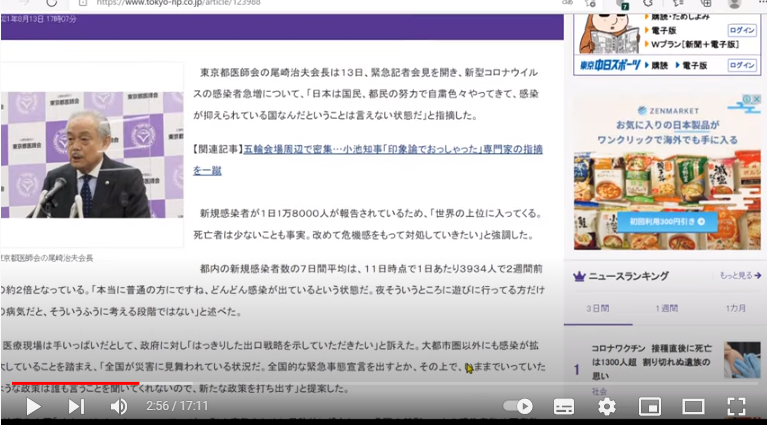
People keep sending me this video on Youtube about ivermectin and Japan, and I think it's a wonderful litmus test for basic critical thinking
It's nonsense, and the deficiencies are very obvious
It's nonsense, and the deficiencies are very obvious
https://twitter.com/dRazanj/status/1463995218932477957
In the video, Dr. John Campbell repeats the claim that, since Covid-19 claims dropped after the 13th of August, and as this was the point that ivermectin was "allowed as a treatment", this means that ivermectin had some massive implied benefit 

But, as Dr. Campbell notes, there was no policy change in Japan on the 13th of August. There was absolutely no difference in terms of patient care before or after this "intervention"
What actually happened was that the chair of the Tokyo Medical Association, a non-official, local group of doctors, gave a press conference where he recommended ivermectin as a treatment
THAT IS LITERALLY IT
THAT IS LITERALLY IT

Prior to the 13th of August, all of these things were true, and after the 13th they were still true. Nothing changed at all except for a press conference 

So, let's take half a second and do some very basic critical thinking here. We have an intervention - a doctor giving a press conference - and an outcome - the dramatic decline in cases
How likely is it that the press conference impacted ivermectin use and/or cases?
How likely is it that the press conference impacted ivermectin use and/or cases?
In this case, we've actually got a control! The same doctor, it turns out, has been recommending ivermectin for most of 2021. He even gave a press conference saying the same thing in February 

As to whether this second press conference changed behaviour in Japan sufficiently to increase use of ivermectin at all, we simply don't know. No one has assessed ivermectin prescribing trends because that requires some minimal due diligence
In other words, we don't even know if one doctor promoting ivermectin appreciably increased its use, never mind whether this may have translated into a decrease in cases
It does seem incredibly unlikely that a non-official press conference that changed nothing about ivermectin prescription or supply would dramatically change the use of the drug, but the point is that the entire idea is predicated on vague supposition anyway
What we do know is that in our control intervention, cases dropped a little then rose shortly after. So it's a pretty long bow to suggest that the press conference sometimes increases cases but at other times decreases them 

The most likely explanation here seems to be that there's basically no relationship between one doctor giving press conferences and the number of cases in Japan, which to be honest is probably what we'd expect
• • •
Missing some Tweet in this thread? You can try to
force a refresh






